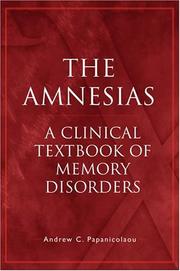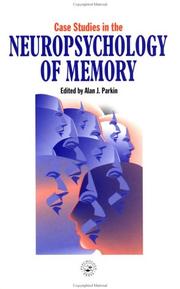| Listing 1 - 10 of 51 | << page >> |
Sort by
|

ISBN: 1281143359 9786611143350 1846427193 9781846427190 9781281143358 9781843108634 1843108631 6611143351 Year: 2007 Publisher: London ; Philadelphia : Jessica Kingsley Publishers,
Abstract | Keywords | Export | Availability | Bookmark
 Loading...
Loading...Choose an application
- Reference Manager
- EndNote
- RefWorks (Direct export to RefWorks)
'A Personal Guide to Living with Progressive Memory Loss serves as a commitment to inclusive education and is a landmark self-help book that focuses on the needs of the person with the diagnosis. It expands what is currently offered to people with memory loss in a sensitive and contemporary way. A must have for every memory clinic and health and human service agency.'. - Linda L. Buettner, Professor at the University of North Carolina at Greensboro, Alzheimer's Association Early Stage Task Force. 'This book empowers people living with dementia, signposting hope, choice and a life to be lived.
Memory disorders --- Impairment, Memory --- Memory, Disorders of --- Memory impairment --- Paramnesia --- Cognition disorders --- Prevention

ISBN: 1280534583 0198038526 9781280534584 9780198038528 0195172450 9780195172454 019770557X Year: 2023 Publisher: New York ; Oxford : Oxford University Press,
Abstract | Keywords | Export | Availability | Bookmark
 Loading...
Loading...Choose an application
- Reference Manager
- EndNote
- RefWorks (Direct export to RefWorks)
This is a clinical text on the disorders of memory that result from psychological stress, traumatic injury, strokes, or degenerative diseases of the brain. Each amnesia syndrome is dealt with in a separate chapter that includes a clear account of the symptoms and the tests used to assess them.
Memory disorders. --- Impairment, Memory --- Memory, Disorders of --- Memory impairment --- Paramnesia --- Cognition disorders --- Amnesia --- Memory --- physiopathology. --- physiology.
Book
Year: 2017 Publisher: Frontiers Media SA
Abstract | Keywords | Export | Availability | Bookmark
 Loading...
Loading...Choose an application
- Reference Manager
- EndNote
- RefWorks (Direct export to RefWorks)
Welcome! We, humans, tend to experience forgetfulness when we get old. The forgetfulness may become more serious memory impairment, dementia. Presumably, we have known it for a long time, but we still do not know the mechanism behind. A normal part of forgetfulness is called age-related memory impairment (AMI), which is considered the first step towards mild cognitive impairment (MCI; transition state) and dementia (disease state). The majority of dementia is attributable to Alzheimer’s disease (AD). Progression to dementia occurs at a high rate in patients with AMI. This eBook covers exciting but yet challenging field of cognitive aging. AMI is specific to neural tissues of the brain and is considered to be segmental aging. It happens not only to humans but also to a variety of species. Learning and memory are vulnerable to aging in a wide variety of model species, including worms, fruit flies, insects, snails, fishes, and rodents. Aging specifically reduces the ability to learn new information but leaves “old” memories and procedural memory intact. A comparative approach including the use of model systems seems to facilitate understanding of the molecular mechanisms that lead to AMI and AD. We advocate research on model systems. This eBook also provides the first manuscript co-authored with an AD patient to create a feedback loop from patients incorporated into research. We also included a manuscript on the semi-automated system that was inspired by such a feedback. Those may place a nice flavor to this exciting series of comparative research on cognitive aging. We hope you enjoy this eBook. Warm regards, Shin Murakami, Ph.D.Welcome! We, humans, tend to experience forgetfulness when we get old. The forgetfulness may become more serious memory impairment, dementia. Presumably, we have known it for a long time, but we still do not know the mechanism behind. A normal part of forgetfulness is called age-related memory impairment (AMI), which is considered the first step towards mild cognitive impairment (MCI; transition state) and dementia (disease state). The majority of dementia is attributable to Alzheimer’s disease (AD). Progression to dementia occurs at a high rate in patients with AMI. This eBook covers exciting but yet challenging field of cognitive aging. AMI is specific to neural tissues of the brain and is considered to be segmental aging. It happens not only to humans but also to a variety of species. Learning and memory are vulnerable to aging in a wide variety of model species, including worms, fruit flies, insects, snails, fishes, and rodents. Aging specifically reduces the ability to learn new information but leaves “old” memories and procedural memory intact. A comparative approach including the use of model systems seems to facilitate understanding of the molecular mechanisms that lead to AMI and AD. We advocate research on model systems. This eBook also provides the first manuscript co-authored with an AD patient to create a feedback loop from patients incorporated into research. We also included a manuscript on the semi-automated system that was inspired by such a feedback. Those may place a nice flavor to this exciting series of comparative research on cognitive aging. We hope you enjoy this eBook. Warm regards, Shin Murakami, Ph.D.
Parkinson's disease --- outreach --- age-related memory impairment --- Semi-automated system --- Alzheimer's disease --- Patients --- Dementia
Book
Year: 2017 Publisher: Frontiers Media SA
Abstract | Keywords | Export | Availability | Bookmark
 Loading...
Loading...Choose an application
- Reference Manager
- EndNote
- RefWorks (Direct export to RefWorks)
Welcome! We, humans, tend to experience forgetfulness when we get old. The forgetfulness may become more serious memory impairment, dementia. Presumably, we have known it for a long time, but we still do not know the mechanism behind. A normal part of forgetfulness is called age-related memory impairment (AMI), which is considered the first step towards mild cognitive impairment (MCI; transition state) and dementia (disease state). The majority of dementia is attributable to Alzheimer’s disease (AD). Progression to dementia occurs at a high rate in patients with AMI. This eBook covers exciting but yet challenging field of cognitive aging. AMI is specific to neural tissues of the brain and is considered to be segmental aging. It happens not only to humans but also to a variety of species. Learning and memory are vulnerable to aging in a wide variety of model species, including worms, fruit flies, insects, snails, fishes, and rodents. Aging specifically reduces the ability to learn new information but leaves “old” memories and procedural memory intact. A comparative approach including the use of model systems seems to facilitate understanding of the molecular mechanisms that lead to AMI and AD. We advocate research on model systems. This eBook also provides the first manuscript co-authored with an AD patient to create a feedback loop from patients incorporated into research. We also included a manuscript on the semi-automated system that was inspired by such a feedback. Those may place a nice flavor to this exciting series of comparative research on cognitive aging. We hope you enjoy this eBook. Warm regards, Shin Murakami, Ph.D.Welcome! We, humans, tend to experience forgetfulness when we get old. The forgetfulness may become more serious memory impairment, dementia. Presumably, we have known it for a long time, but we still do not know the mechanism behind. A normal part of forgetfulness is called age-related memory impairment (AMI), which is considered the first step towards mild cognitive impairment (MCI; transition state) and dementia (disease state). The majority of dementia is attributable to Alzheimer’s disease (AD). Progression to dementia occurs at a high rate in patients with AMI. This eBook covers exciting but yet challenging field of cognitive aging. AMI is specific to neural tissues of the brain and is considered to be segmental aging. It happens not only to humans but also to a variety of species. Learning and memory are vulnerable to aging in a wide variety of model species, including worms, fruit flies, insects, snails, fishes, and rodents. Aging specifically reduces the ability to learn new information but leaves “old” memories and procedural memory intact. A comparative approach including the use of model systems seems to facilitate understanding of the molecular mechanisms that lead to AMI and AD. We advocate research on model systems. This eBook also provides the first manuscript co-authored with an AD patient to create a feedback loop from patients incorporated into research. We also included a manuscript on the semi-automated system that was inspired by such a feedback. Those may place a nice flavor to this exciting series of comparative research on cognitive aging. We hope you enjoy this eBook. Warm regards, Shin Murakami, Ph.D.
Parkinson's disease --- outreach --- age-related memory impairment --- Semi-automated system --- Alzheimer's disease --- Patients --- Dementia
Book
Year: 2017 Publisher: Frontiers Media SA
Abstract | Keywords | Export | Availability | Bookmark
 Loading...
Loading...Choose an application
- Reference Manager
- EndNote
- RefWorks (Direct export to RefWorks)
Welcome! We, humans, tend to experience forgetfulness when we get old. The forgetfulness may become more serious memory impairment, dementia. Presumably, we have known it for a long time, but we still do not know the mechanism behind. A normal part of forgetfulness is called age-related memory impairment (AMI), which is considered the first step towards mild cognitive impairment (MCI; transition state) and dementia (disease state). The majority of dementia is attributable to Alzheimer’s disease (AD). Progression to dementia occurs at a high rate in patients with AMI. This eBook covers exciting but yet challenging field of cognitive aging. AMI is specific to neural tissues of the brain and is considered to be segmental aging. It happens not only to humans but also to a variety of species. Learning and memory are vulnerable to aging in a wide variety of model species, including worms, fruit flies, insects, snails, fishes, and rodents. Aging specifically reduces the ability to learn new information but leaves “old” memories and procedural memory intact. A comparative approach including the use of model systems seems to facilitate understanding of the molecular mechanisms that lead to AMI and AD. We advocate research on model systems. This eBook also provides the first manuscript co-authored with an AD patient to create a feedback loop from patients incorporated into research. We also included a manuscript on the semi-automated system that was inspired by such a feedback. Those may place a nice flavor to this exciting series of comparative research on cognitive aging. We hope you enjoy this eBook. Warm regards, Shin Murakami, Ph.D.Welcome! We, humans, tend to experience forgetfulness when we get old. The forgetfulness may become more serious memory impairment, dementia. Presumably, we have known it for a long time, but we still do not know the mechanism behind. A normal part of forgetfulness is called age-related memory impairment (AMI), which is considered the first step towards mild cognitive impairment (MCI; transition state) and dementia (disease state). The majority of dementia is attributable to Alzheimer’s disease (AD). Progression to dementia occurs at a high rate in patients with AMI. This eBook covers exciting but yet challenging field of cognitive aging. AMI is specific to neural tissues of the brain and is considered to be segmental aging. It happens not only to humans but also to a variety of species. Learning and memory are vulnerable to aging in a wide variety of model species, including worms, fruit flies, insects, snails, fishes, and rodents. Aging specifically reduces the ability to learn new information but leaves “old” memories and procedural memory intact. A comparative approach including the use of model systems seems to facilitate understanding of the molecular mechanisms that lead to AMI and AD. We advocate research on model systems. This eBook also provides the first manuscript co-authored with an AD patient to create a feedback loop from patients incorporated into research. We also included a manuscript on the semi-automated system that was inspired by such a feedback. Those may place a nice flavor to this exciting series of comparative research on cognitive aging. We hope you enjoy this eBook. Warm regards, Shin Murakami, Ph.D.
Parkinson's disease --- outreach --- age-related memory impairment --- Semi-automated system --- Alzheimer's disease --- Patients --- Dementia
Book
ISBN: 9781619427112 1619427117 9781619426993 1619426994 Year: 2012 Publisher: Hauppauge, N.Y. : Nova Science Publishers,
Abstract | Keywords | Export | Availability | Bookmark
 Loading...
Loading...Choose an application
- Reference Manager
- EndNote
- RefWorks (Direct export to RefWorks)
Long-term memory. --- Memory disorders. --- Impairment, Memory --- Memory, Disorders of --- Memory impairment --- Paramnesia --- Cognition disorders --- Long-term retention (Memory) --- Memory
Book
ISBN: 0470266988 Year: 1979 Publisher: Hillsdale Erlbaum
Abstract | Keywords | Export | Availability | Bookmark
 Loading...
Loading...Choose an application
- Reference Manager
- EndNote
- RefWorks (Direct export to RefWorks)
Memory disorders --- 159.95 --- 616.89 --- Impairment, Memory --- Memory, Disorders of --- Memory impairment --- Paramnesia --- Cognition disorders --- Geestelijke functies --- Psychopathologie --- Memory disorders. --- 159.95 Geestelijke functies

ISBN: 0863775063 9781315784885 1315784882 9781317715856 1317715853 9781317715832 1317715837 9781317715849 1317715845 9780863775062 9780863775079 0863775071 Year: 1997 Publisher: Hove : Psychology Press,
Abstract | Keywords | Export | Availability | Bookmark
 Loading...
Loading...Choose an application
- Reference Manager
- EndNote
- RefWorks (Direct export to RefWorks)
#PBIB:2000.4 --- Memory disorders --- Experimentele psychologie --- Case studies. --- geheugen en aandacht --- geheugen en aandacht. --- Impairment, Memory --- Memory, Disorders of --- Memory impairment --- Paramnesia --- Case studies --- Cognition disorders
Book
ISBN: 144222049X 9781442220492 1299613977 9781299613973 9781442220485 1442220481 Year: 2013 Publisher: Lanham : Rowman & Littlefield Publishers, Inc.,
Abstract | Keywords | Export | Availability | Bookmark
 Loading...
Loading...Choose an application
- Reference Manager
- EndNote
- RefWorks (Direct export to RefWorks)
As our population ages and fears about dementia, Alzheimer's, and related brain problems continue to grow, this book will help shed light on how the brain functions, what we can do to prevent the most severe symptoms of aging, and steps we can take to ward off disease.
Brain --- Memory disorders --- Impairment, Memory --- Memory, Disorders of --- Memory impairment --- Paramnesia --- Cognition disorders --- Cerebrum --- Mind --- Central nervous system --- Head --- Diseases --- Prevention --- Aging
Book
ISBN: 1139950312 1139961985 1139949268 1139960938 1139956698 1139958828 1139957767 1139959875 1139547380 9781139957762 9781139547383 9781139959872 9781107035225 1107035228 1316623262 9781316623268 Year: 2014 Publisher: Cambridge : Cambridge University Press,
Abstract | Keywords | Export | Availability | Bookmark
 Loading...
Loading...Choose an application
- Reference Manager
- EndNote
- RefWorks (Direct export to RefWorks)
When the memory retrieval process breaks down, people wonder exactly why and how such a thing occurs. In many cases, failed retrieval is accompanied by a 'tip-of-the-tongue state', a feeling that an unretrieved item is stored in memory. Tip-of-the-tongue states stand at the crossroads of several research traditions within cognitive science. Some research focuses on the nature of the retrieval failure. Other research tries to determine what tip-of-the-tongue states can tell us about the organization of lexical memory - what aspects of a word we can recall when we are otherwise unable to do so. Still other research focuses on the nature of the experience. Each perspective is represented in this book, which presents the best theoretical and empirical work on these subjects. Much of the work is cross-disciplinary, but the topics concern strong phenomenological states of knowing that are not accompanied by recall or recognition of the desired information.
Memory disorders. --- Metacognition. --- Recollection (Psychology) --- Recall (Psychology) --- Memory --- Recognition (Psychology) --- Meta knowledge --- Metamemory --- Cognition --- Self-control --- Self-perception --- Impairment, Memory --- Memory, Disorders of --- Memory impairment --- Paramnesia --- Cognition disorders
| Listing 1 - 10 of 51 | << page >> |
Sort by
|

 Search
Search Feedback
Feedback About
About Help
Help News
News